- Home
- Debra Holland
Healing Montana Sky
Healing Montana Sky Read online
Other Books by Debra Holland
Montana Sky Series
1892
Beneath Montana’s Sky
1886
Mail-Order Brides of the West: Trudy
Mail-Order Brides of the West: Lina
Mail-Order Brides of the West: Darcy
Mail-Order Brides of the West: Prudence
1890s
Wild Montana Sky
Starry Montana Sky
Stormy Montana Sky
Montana Sky Christmas
A Valentine’s Choice
Painted Montana Sky
Glorious Montana Sky
Healing Montana Sky
Sweetwater Springs Scrooge
Sweetwater Springs Christmas
Mystic Montana Sky (July 2016)
2015
Angel in Paradise
The Gods’ Dream Trilogy: Fantasy Romance
Sower of Dreams
Reaper of Dreams
Harvest of Dreams
Twinborne Trilogy
Lywin’s Quest
Nonfiction
The Essential Guide to Grief and Grieving
Cultivating an Attitude of Gratitude
This is a work of fiction. Names, characters, organizations, places, events, and incidents are either products of the author’s imagination or are used fictitiously.
Text copyright © 2015 Debra Holland
All rights reserved.
No part of this book may be reproduced, or stored in a retrieval system, or transmitted in any form or by any means, electronic, mechanical, photocopying, recording, or otherwise, without express written permission of the publisher.
Published by Montlake Romance, Seattle
www.apub.com
Amazon, the Amazon logo, and Montlake Romance are trademarks of Amazon.com, Inc., or its affiliates.
ISBN-13: 9781503948808
ISBN-10: 1503948803
Cover design by Delle Jacobs
To My Cousin and Personal Assistant, Mindy Codner Freed
The idea for Healing Montana Sky came about when Mindy went into labor with her (now four-year-old) son, Adam. The baby became stuck and ended up being suctioned out while a team of nurses pushed on Mindy’s belly. Only the miracle of modern medicine saved Mindy from the fate of Daisy Muth. One hundred and twenty years ago, Adam probably wouldn’t have survived, either.
Nowadays, we take for granted that women rarely die in childbirth and we forget how, for much of human history, childbirth (and the complications from giving birth) was a primary cause of death for women of childbearing age.
Contents
Notes from the Author
CHAPTER ONE
CHAPTER TWO
CHAPTER THREE
CHAPTER FOUR
CHAPTER FIVE
CHAPTER SIX
CHAPTER SEVEN
CHAPTER EIGHT
CHAPTER NINE
CHAPTER TEN
CHAPTER ELEVEN
CHAPTER TWELVE
CHAPTER THIRTEEN
CHAPTER FOURTEEN
CHAPTER FIFTEEN
CHAPTER SIXTEEN
CHAPTER SEVENTEEN
CHAPTER EIGHTEEN
CHAPTER NINETEEN
CHAPTER TWENTY
CHAPTER TWENTY-ONE
CHAPTER TWENTY-TWO
CHAPTER TWENTY-THREE
CHAPTER TWENTY-FOUR
CHAPTER TWENTY-FIVE
CHAPTER TWENTY-SIX
Preview: Mystic Montana Sky
From the Author
Acknowledgments
About the Author
Notes from the Author
Healing Montana Sky takes place in the spring and summer of 1895, overlapping in time with Glorious Montana Sky and Painted Montana Sky.
Antonia Valleau, the heroine in Healing Montana Sky, is illiterate, and her dialogue and italicized interior thoughts reflect her lack of education. But using the same simplistic and ungrammatical patterns when she’s thinking would be burdensome to the reader. So I’ve chosen to have her thoughts read more smoothly.
Keep in mind that in previous generations, due to the intense labor required for sheer survival on the frontier, children were often left alone and expected to entertain themselves and do chores from a very early age. Children were also supposed to “be seen and not heard,” and parenting wasn’t as childcentric as it is today.
CHAPTER ONE
In the Mountains Above Sweetwater Springs
Spring 1895
Antonia Valleau cast the first shovelful of dirt onto her husband’s fur-shrouded body, lying in the grave she’d dug in their garden plot, the only place where the soil wasn’t still rock hard. I won’t be breakin’ down. For the sake of my children, I must be strong. Pain squeezed her chest like a steel trap. She had to force herself to take a deep breath, inhaling the scent of loam and pine. I must be doing this.
She drove the shovel into the soil heaped next to the grave, hefted the laden blade, and dumped the earth over Jean-Claude, trying to block out the thumping sound the soil made as it covered him. Even as Antonia scooped and tossed, her muscles aching from the effort, her heart stayed numb, and her mind kept playing out the last sight of her husband. The memory haunting her, she paused to catch her breath and wipe the sweat off her brow, her face hot from exertion in spite of the cool spring air.
Antonia touched the tips of her dirty fingers to her lips. She could still feel the pressure of Jean-Claude’s mouth on hers as he’d kissed her before striding out the door for a day of hunting. She’d held up baby Jacques, and Jean-Claude had tapped his son’s nose. Jacques had let out a belly laugh that made his father respond in kind. Her heart had filled with so much love and pride in her family that she’d chuckled, too.
Stepping outside, she’d watched Jean-Claude ruffle the dark hair of their six-year-old, Henri. Then he strode off, whistling, with his rifle over his shoulder. She’d thought it would be a good day—a normal day. She assumed her husband would return to their mountain home in the afternoon before dusk as he always did, unless he had a longer hunt planned.
As Antonia filled the grave, she denied she was burying her husband. Jean-Claude be gone a checkin’ the trap line, she told herself, flipping the dirt onto his shroud.
She moved through the nightmare with leaden limbs, a knotted stomach, burning dry eyes, and a throat that felt as though a log had lodged there. While Antonia shoveled, she kept glancing at her little house, where, inside, Henri watched over the sleeping baby. From the garden, she couldn’t see the doorway.
She worried about her son—what the glimpse of his father’s bloody body had done to the boy. Mon Dieu, she couldn’t stop to comfort him. Not yet. Henri had promised to stay inside with the baby, but she didn’t know how long she had before Jacques woke up.
Once she finished burying Jean-Claude, Antonia would have to put her sons on a mule and trek to where she’d found her husband’s body clutched in the great arms of the dead grizzly. She wasn’t about to let his last kill lie there for the animals and the elements to claim. Her family needed that meat and the fur.
She heard a sleepy wail that meant Jacques had awakened. Just a few more shovelfuls. Antonia forced herself to hurry, despite how her arms, shoulders, and back screamed in pain.
When she finished the last shovelful of earth, exhausted, Antonia sank to her knees, facing the cabin, her back to the grave, placing herself between her sons and where their father lay. She should go to them, but she was too depleted to move.
Jacques appeared on his hands and knees, peering around the corner of the ca
bin. His dark eyes lit with pleasure when he saw her. The baby flashed Antonia his wide grin and scooted toward her. Only in the last two days had he gone from pushing himself across the floor to a hands-and-knees crawl.
Henri trailed so close behind Jacques that he had to walk wide-legged so he didn’t step on his brother.
The baby reached her, placed his hands on her legs, and pressed himself up, grabbing at the front of her tunic. “Maa.”
Antonia hugged Jacques. He’d soiled his rabbit skin diaper and smelled, but she held him close, needing to feel the baby in her arms.
He wiggled in protest.
She dropped a kiss on his forehead and reached up to her shoulder to unlace the leather ties of her tunic, pulling the flap down to free her breast. He began to suckle greedily.
Henri dropped to her other side and leaned against her.
Antonia put her arm around him. Just holding her sons brought her comfort but also increased her despair. What do I be doin’ now?
Should I be takin’ the boys and leave? Head for Sweetwater Springs?
Antonia shook her head. No! I won’t be leavin’ Jean-Claude. Cain’t leave my home.
But without her husband to provide for them, she didn’t know how long she’d be able to manage on her own.
Somehow, I’ll be findin’ a way, Antonia vowed.
Three days later, Antonia took a final look around the log cabin. Just one snug room, made with Jean-Claude’s and her own hands, it had sheltered her family for the last two years. Only the table and log chairs remained in front of the river-rock fireplace. She’d been dreading spending another long winter cooped up with a young boy and a toddler in the small space. Now, though, she’d give anything to stay, to experience the love and warmth once contained within these walls. But the house remained empty—not just of their possessions, which she’d packed on the two mules—but of the love, now lost to her forever, that had made the cabin a home.
The tears she’d held back since her discovery of Jean-Claude’s body threatened to fall, and she abruptly turned and walked outside for one final look. The spring sun shone through the pines and dappled the needle-strewn ground. Her garden, now a graveyard, lay on one side of the cabin, surrounded by a high split-rail fence to keep out the deer. Before long, the forest would reclaim the plot she’d worked so hard to cultivate. She approached the grave, her heart as heavy as her steps.
Antonia reached the spot marked with a crude wooden cross, lashed together with leather strips, and sank to her knees. She wanted to throw herself over the mound and sob. But that act would frighten the children. She placed a palm on the dirt, feeling the loose soil shift under her hand. “Good-bye, my love.”
The rest of the words clogged her throat. How do I be tellin’ a dead man that I’m a leavin’ him? Not that her husband was really here.
Antonia crossed herself. She believed Jean-Claude was in heaven, having sweet-talked his way right out of purgatory. He was probably laughing and telling stories to the angels, charming them as he had her. I be the one livin’ alone without him.
Be I doin’ the right thing. . .leavin’? For two days, uncertainty had weighed in her stomach like a rock, while her mind twisted between thoughts of Jean-Claude and debating plans for the future. Can we be survivin’ here? The question had eaten at her. She desperately wanted to find a way to stay in her home. Although a good shot herself, Antonia couldn’t take the children hunting. Nor could she leave them alone when she went.
She glanced over her shoulder at her older son.
Henri held the reins of the two mules, an unhappy expression on his face. The baby stood on tottery legs and clutched his brother around his hips.
Her heart twisted. How could she help her sons? They adored their father. Henri had cried himself to sleep last night. And her usually placid Jacques had fussed, waking up off and on. She’d barely had a wink of sleep.
Antonia motioned them to her.
Henri tied the reins to a branch and gently pushed Jacques to the ground. Her oldest son walked over, his feet dragging. The baby crawled after.
She patted the ground next to her. “Say good-bye to Père, mon fils.”
The boy looked from the mound to her, his face drawn and a sorrowful look in his eyes. “You say Père be in heaven, Maman.”
Jacques climbed on the grave and played with some loose dirt.
“He be, mon petit chéri.” Aching with love for him, Antonia smoothed back the hair from Henri’s face, wanting to find words to comfort him, to help her son understand. “His body lies here, though, and we are leaving.” Her voice thickened. “So we’re saying good-bye, although we’ll never forget him.”
Henri’s face scrunched, and tears came to his eyes. He dropped to his knees and leaned into her. “Why he be a dyin’, Maman?”
What be an answer to that? “I cain’t tell you, Henri.”
“I want Père back.”
She put her arm around the boy and squeezed him close. “I be wantin’ that, too.”
Jacques crawled to them.
Antonia gathered the baby close, inhaling his scent. She gave him a squeeze, kissed his plump cheek, and stood. She tried to send Henri an encouraging smile, but her mouth wouldn’t stretch, and it probably came out as a grimace. “Be you ready for an adventure, Henri?”
“Yes, Maman,” he said in a subdued tone.
Antonia missed her son’s usual high spirits and gamine grin. How long before they’ll return? She tried to suppress the secret fear that Henri would never again be the same, his happy personality buried with Jean-Claude in his grave.
“Up on the mule then,” Antonia said briskly. “You be a big boy now and can ride by your lone self. I’m dependin’ on you to be holding tight to your brother. Can you be doin’ that?”
His expression brightened, which gave her a glimmer of hope, and he nodded.
Antonia helped him climb into the saddle and then lifted Jacques in front of him. Behind the saddle, she’d lashed their clothing and sleeping furs. “Hold him tight, now,” she repeated.
“Oui, Maman.”
“In three days, Henri, we be arrivin’ in Sweetwater Springs.” She tried to instill some enthusiasm into her voice, but her tone sounded so heavy Antonia knew she’d failed. “You be havin’ your first sight of a town.”
The other mule was laden with Jean-Claude’s rifle, his furs and hides, along with more of their meager possessions. A cast-iron Dutch oven and a metal bucket rode on top of the heap. Antonia shrugged into her own pack, hefted her rifle, and took the reins of both mules. Throat tight, she glanced behind for one final glimpse of her home and then resolutely faced forward, leading them down the trail.
CHAPTER TWO
On the Prairie Outside Sweetwater Springs
In the tree-shaded edge of pasture outside the barn, Erik Muth watched two newborn calves nurse, one on each side of their dam, and his chest swelled with satisfaction. Two heifers! A double blessing and a good addition to my milk herd. He’d been plowing a field when his favorite cow, Annabelle Lee, had disappeared from the herd, a sure sign she’d gone off to hide and birth her calf.
The cow wasn’t hard to find. Trees grew only along the tiny stream trickling from the springhouse well and cutting through the pasture. Although he knew Annabelle Lee was an old hand at birthing her babies, he stayed with her to help with the delivery.
Erik stepped out of the shade and blinked in the bright sunlight. He hadn’t realized half the morning had gone by already. He paused for a moment to survey his property, feeling a sense of pride at all he’d accomplished in the last six years. He took a deep breath of the fresh prairie air, inhaling the scent of turned earth and new growth.
Across the barnyard was his house, made with squared-off logs—a long, low building, nestled into the hillside. Two windows were set in the front and one on each side. A porch jutted in front. The sod roof kept the dwelling cool in the summer and warm in the winter. He already had a plan to expand his home—when
the baby grew enough to need a sleeping room.
Erik squinted against the glare of the sun, trying to see his wife, Daisy, on the porch. He blinked, wondering why she wasn’t there now. Usually after finishing the morning chores, weather permitting, she spent all her time out front, doing handwork or other tasks such as shelling peas or scrubbing clothes before she needed to start cooking his supper.
Maybe she’s lying down. She’d become more and more tired as the months of her pregnancy crept by.
I’d better go check on her. He glanced down and saw his blood- and muck-stained hands and shirt. Knowing his sensitive wife would shrink from the sight, Erik figured he’d better wash up before he entered the house. As much as possible, he tried to shield Daisy—not something that was easy to do on a farm.
Erik strode to the barrel-well next to the springhouse and pumped water until it spilled into a small metal trough. He plunged in his hands, wetting his arms to his elbows to get off the blood from the birth. He rubbed his wet hands over his shirt but only succeeded in turning the red stain to pink. Then he picked up the trough and tossed the dirty water into the rosebush Daisy had planted near the left of the well. Some of the water splashed dirt on a tight bud that hung heavy on a branch, almost to the ground. Daisy had watched the bush for days, eager to see the first flower burst into bloom.
He picked up the bucket stored by the well, hung the handle on the top of the pump, and filled the pail. At her advanced state of pregnancy, his petite wife had difficulty carrying the water bucket without spilling, so he almost always brought in fresh water when entering the house.
He headed toward the porch, anticipating Daisy’s reaction to his good news. She loved baby animals and would be doubly glad for heifers because they wouldn’t grow up to be slaughtered. His wife shared his dreams of creating a prosperous farm, not just from the wheat he planted on the prairie, but from the dairy herd he planned to expand from the seven, no nine, cows he had now—including the five calves. He dreamed of fostering his family’s legacy, making cheese, and selling his wares in town—maybe even shipping them off to some of Montana’s cities.

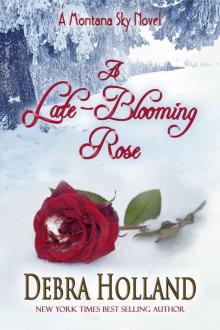 A Late-Blooming Rose: A Montana Sky Series Novel
A Late-Blooming Rose: A Montana Sky Series Novel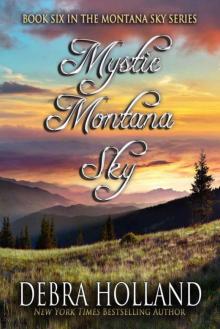 Mystic Montana Sky (The Montana Sky Series Book 6)
Mystic Montana Sky (The Montana Sky Series Book 6)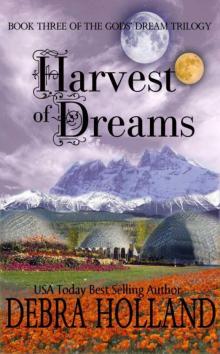 Harvest of Dreams (The Gods' Dream Trilogy)
Harvest of Dreams (The Gods' Dream Trilogy)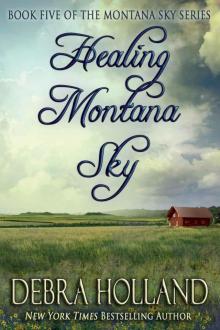 Healing Montana Sky
Healing Montana Sky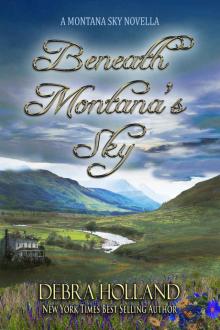 Beneath Montana's Sky: A Montana Sky Novella (The Montana Sky Series Book 0)
Beneath Montana's Sky: A Montana Sky Novella (The Montana Sky Series Book 0)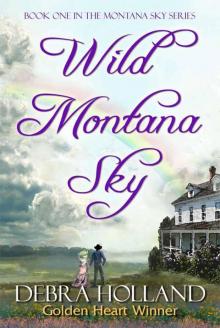 Wild Montana Sky (The Montana Sky Series)
Wild Montana Sky (The Montana Sky Series)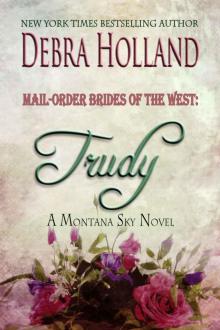 Mail-Order Brides of the West: Trudy (A Montana Sky Series Novel)
Mail-Order Brides of the West: Trudy (A Montana Sky Series Novel)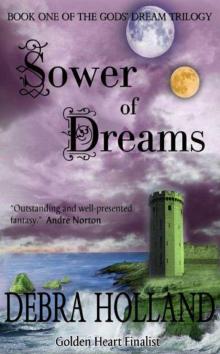 Sower of Dreams (The Gods' Dream Trilogy)
Sower of Dreams (The Gods' Dream Trilogy)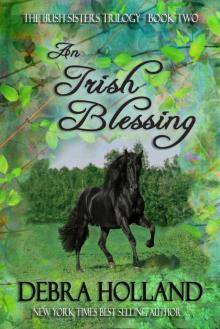 An Irish Blessing: The Irish Sisters Trilogy (Montana Sky Series)
An Irish Blessing: The Irish Sisters Trilogy (Montana Sky Series)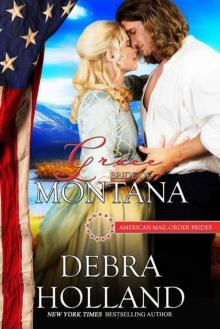 Grace: Bride of Montana (American Mail-Order Bride 41)
Grace: Bride of Montana (American Mail-Order Bride 41) Glorious Montana Sky (The Montana Sky Series)
Glorious Montana Sky (The Montana Sky Series) Montana Sky Christmas: A Sweetwater Springs Short Story Collection
Montana Sky Christmas: A Sweetwater Springs Short Story Collection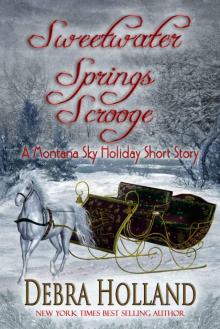 Sweetwater Springs Scrooge: A Montana Sky Holiday Short Story (The Montana Sky Series)
Sweetwater Springs Scrooge: A Montana Sky Holiday Short Story (The Montana Sky Series) MONTANA SKY 07.5: Angel In Paradise
MONTANA SKY 07.5: Angel In Paradise Singing Montana Sky (The Montana Sky Series Book 7)
Singing Montana Sky (The Montana Sky Series Book 7)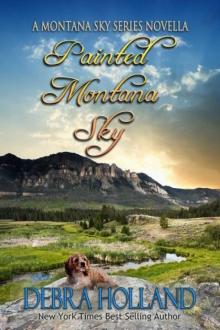 Painted Montana Sky: A Montana Sky Series Novella
Painted Montana Sky: A Montana Sky Series Novella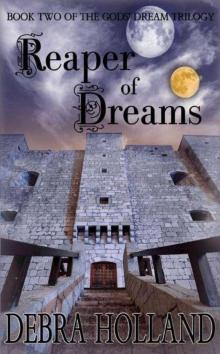 Reaper of Dreams (The Gods' Dream Trilogy)
Reaper of Dreams (The Gods' Dream Trilogy) A Valentine's Choice: A Montana Sky Series Holiday Novella (The Montana Sky Series)
A Valentine's Choice: A Montana Sky Series Holiday Novella (The Montana Sky Series)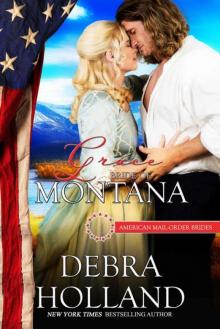 Grace_Bride of Montana
Grace_Bride of Montana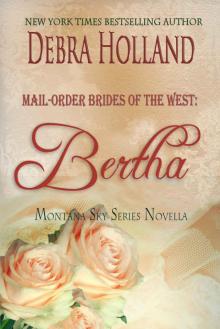 Mail-Order Brides of the West: Bertha: A Montana Sky Novella (Montana Sky Series)
Mail-Order Brides of the West: Bertha: A Montana Sky Novella (Montana Sky Series)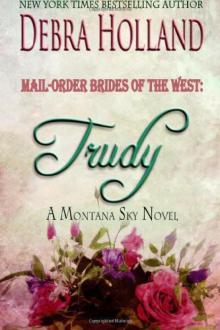 Trudy
Trudy